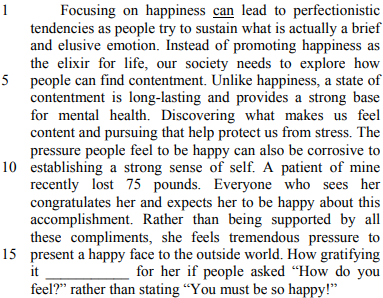Questões Militares
Comentadas sobre vocabulário | vocabulary em inglês
Foram encontradas 401 questões
“In a number-only count, the additional 500 thefts or homicides would result in the same overall number of crimes, yet clearly the impacts are disparate”.
Choose the option that correctly corresponds to the blank spaces.
“Remember that where ________ courageous soldiers, _________ eternal glory.”
There are three areas where our behaviour can directly influence our students’ continuing participation: goals and goal setting; learning environment; interesting classes.
(J. Harmer, The practice of English language teaching. 4th ed. Essex: Pearson Longman, 2007. Adaptado)
The task proposed in the last paragraph of the text on ChatGPT illustrates the following motivational behavior on the part of teachers:
Text 1 A11-II
"Click!" That's the sound of safety. That's the sound of survival. That's the sound of a seat belt lockling in place. Seat belts save lives and that's a fact. That's why I don't drive anywhere until mine is on tight. Choosing to wear your seat belt is as simple as choosing between life and death.Which one do may be going 100km/h or faster. That car is zipping down the road. Then somebody ahead of you locks up his or her brakes. You don't have time to stop. The car that you locks up his or her brakes.
Some people think that seat belts are uncool. They think that seat belts cramp their style, or that seat belts are unconfortable. To them, I say, what's more uncomfortable? Wearing a seat belt or flying through a car, of skidding across the road in your jean shorts? Wearing a seat belt is both cooler and more comfortable than the alternatives. Let's just take a you can hop around the car and slide in and out of your seat easily. That sounds like a lot of fun. But, you are also more likely to die or suffer serious injuries. If you are wearing a seat belt, you have to stay in your seat. That's no fun. But, you are much more likely to walk away unharmed from a car accidente. Hmmm... A small pleasure for a serious pain. That's a tough choice. I think that I'll avoid the serious pain.
Internet: <www.agendaweb.com> (adapted).
Text 1 A11-II
"Click!" That's the sound of safety. That's the sound of survival. That's the sound of a seat belt lockling in place. Seat belts save lives and that's a fact. That's why I don't drive anywhere until mine is on tight. Choosing to wear your seat belt is as simple as choosing between life and death.Which one do may be going 100km/h or faster. That car is zipping down the road. Then somebody ahead of you locks up his or her brakes. You don't have time to stop. The car that you locks up his or her brakes.
Some people think that seat belts are uncool. They think that seat belts cramp their style, or that seat belts are unconfortable. To them, I say, what's more uncomfortable? Wearing a seat belt or flying through a car, of skidding across the road in your jean shorts? Wearing a seat belt is both cooler and more comfortable than the alternatives. Let's just take a you can hop around the car and slide in and out of your seat easily. That sounds like a lot of fun. But, you are also more likely to die or suffer serious injuries. If you are wearing a seat belt, you have to stay in your seat. That's no fun. But, you are much more likely to walk away unharmed from a car accidente. Hmmm... A small pleasure for a serious pain. That's a tough choice. I think that I'll avoid the serious pain.
Internet: <www.agendaweb.com> (adapted).

Read the text and answer the question.
The pursuit of happiness can end in pain
Maggie Mulqueen, psychologist

Adapted from https://www.nbcnews.com/think/opinion/suicide-studentathletes-happiness-contentment-rcna27992
Implications of the humanistic approach
Hamachek (1977) provides some useful examples of the kind of educational implications that follow from taking a humanistic approach. First, every learning experience should be seen within the context of helping learners to develop a sense of personal identity. This is in keeping with the view that one important task for the teacher is differentiation, i.e. identifying and seeking to meet the individual learner’s needs within the context of the classroom group. Second, learners should be encouraged to make choices for themselves in what and how they learn. This again is in sharp contrast to the view that the curriculum content for every learner of a similar age should be set in ‘tablets of stone’. Third, it is important for teachers to empathise with their learners by seeking to understand the ways in which they make sense of the world, rather than always seeking to impose their own viewpoints. Fourth, it is important to provide optimum conditions for individualised and group learning of an authentic nature to take place.Thus, from a humanistic perspective, a learning experience of personal consequence occurs when the learner assumes the responsibility of evaluating the degree to which he or she is personally moving toward knowledge rather than looking to an external source for such evaluation.
(Williams, M.; Burden, R.L. Psychology for Language Teachers: A Social Constructivist Approach. Cambridge:CUP, 1999. Adaptado)
The expression ‘rather than’, in the concluding sentence of the text, means
If styles are general characteristics that differentiate one individual from another, then strategies are those specific “attacks” that we make on a given problem, and that vary considerably within each individual. They are the momentby-moment techniques that we employ to solve “problems” posed by second language input and output. Chamot (2005, p. 112) defines strategies quite broadly as “procedures that facilitate a learning task.”
Second language acquisition has distinguished between two types of strategy: learning strategies and communication strategies. The former relate to input — to processing, storage, and retrieval, that is, to taking in messages from others. The latter pertain to output, how we productively express meaning, how we deliver messages to others.
(Brown, H.D. Principles of Language Learning and Teaching. 5th ed. White Plains, NY: Addison Wesley Longman, 2006. Adaptado)
The regional accentism that secretly affects life prospects

At age 22, Gav Murphy was living outside his home country Wales for the first time, working in his first job in media production in London. His South Wales Valleys accent was very thick, he recalls. He’d say ‘tha’ rather than ‘that’, for instance. He was perfectly understandable; yet a senior colleague overseeing his work insisted Murphy change his accent so all the broadcasters sounded uniform on air. The effects of adaptation were far-reaching. “It sort of broke my brain a little bit,” says Murphy. “I thought about literally every single thing I was saying, literally every time I was saying it. Moving to standard English was just laborious.”
Foreign-accent discrimination is rampant in professional settings. But discrimination can also extend to certain native speakers of a language, because of the judgements attached to particular accents. While many employers are becoming very sensitive to other types of bias, accent bias remains challenging to root out. But it doesn’t have to be this way.
While the cognitive shortcuts that contribute to accent bias may be universal, the degree of accent awareness and prejudice varies greatly. For instance, “The UK has a very, very fine-tuned system of accent prestige,” says Devyani Sharma, a sociolinguist at Queen Mary University of London. “It’s a combination of a very monolingual past, where English developed as a symbol of the nation, and the very acute social class hierarchy historically.” She adds that overt accent bias in the US is based more on race, whereas in the UK, it’s more tied to class.
In some cases, accent bias is directly related to government policy. Since the 1860s, the Japanese government has modernised the country with a focus on Tokyo, says Shigeko Kumagai, a linguist at Shizuoka University, Japan. “Thus, standard Japanese was established based on the speech of educated Tokyoites.” In contrast, the Tohoku dialect spoken in northern Japan became “the most stigmatised dialect in Japan”, says Kumagai. Its image is “rural, rustic, old, stubborn, narrow-minded, backward, poor, uneducated, etc”. Young women from Tohoku are often given discriminatory treatment that makes them feel ashamed of their accents.
A pesquisa de Kumagai mostra que a forte estereotipagem do dialeto Tohoku é perpetuada pela concentração da indústria de mídia na capital japonesa. De fato, em todo o mundo, a mídia tem um impacto enorme na percepção dos sotaques. Portanto, entendemos por que a preponderância de emissoras do Reino Unido em Londres provavelmente contribuiu para a marginalização do sotaque galês de MurphyKumagai’s research shows that the strong stereotyping of the Tohoku dialect is perpetuated by the concentration of the media industry in the Japanese capital. Indeed, the world over, the media has an enormous impact on perceptions of accents. So we understand why the preponderance of UK broadcasters in London likely contributed to the marginalisation of Murphy’s Welsh accent.
(Christine Ro. www.bbc.com, 08.05.2022. Adaptado)
The regional accentism that secretly affects life prospects

At age 22, Gav Murphy was living outside his home country Wales for the first time, working in his first job in media production in London. His South Wales Valleys accent was very thick, he recalls. He’d say ‘tha’ rather than ‘that’, for instance. He was perfectly understandable; yet a senior colleague overseeing his work insisted Murphy change his accent so all the broadcasters sounded uniform on air. The effects of adaptation were far-reaching. “It sort of broke my brain a little bit,” says Murphy. “I thought about literally every single thing I was saying, literally every time I was saying it. Moving to standard English was just laborious.”
Foreign-accent discrimination is rampant in professional settings. But discrimination can also extend to certain native speakers of a language, because of the judgements attached to particular accents. While many employers are becoming very sensitive to other types of bias, accent bias remains challenging to root out. But it doesn’t have to be this way.
While the cognitive shortcuts that contribute to accent bias may be universal, the degree of accent awareness and prejudice varies greatly. For instance, “The UK has a very, very fine-tuned system of accent prestige,” says Devyani Sharma, a sociolinguist at Queen Mary University of London. “It’s a combination of a very monolingual past, where English developed as a symbol of the nation, and the very acute social class hierarchy historically.” She adds that overt accent bias in the US is based more on race, whereas in the UK, it’s more tied to class.
In some cases, accent bias is directly related to government policy. Since the 1860s, the Japanese government has modernised the country with a focus on Tokyo, says Shigeko Kumagai, a linguist at Shizuoka University, Japan. “Thus, standard Japanese was established based on the speech of educated Tokyoites.” In contrast, the Tohoku dialect spoken in northern Japan became “the most stigmatised dialect in Japan”, says Kumagai. Its image is “rural, rustic, old, stubborn, narrow-minded, backward, poor, uneducated, etc”. Young women from Tohoku are often given discriminatory treatment that makes them feel ashamed of their accents.
A pesquisa de Kumagai mostra que a forte estereotipagem do dialeto Tohoku é perpetuada pela concentração da indústria de mídia na capital japonesa. De fato, em todo o mundo, a mídia tem um impacto enorme na percepção dos sotaques. Portanto, entendemos por que a preponderância de emissoras do Reino Unido em Londres provavelmente contribuiu para a marginalização do sotaque galês de MurphyKumagai’s research shows that the strong stereotyping of the Tohoku dialect is perpetuated by the concentration of the media industry in the Japanese capital. Indeed, the world over, the media has an enormous impact on perceptions of accents. So we understand why the preponderance of UK broadcasters in London likely contributed to the marginalisation of Murphy’s Welsh accent.
(Christine Ro. www.bbc.com, 08.05.2022. Adaptado)